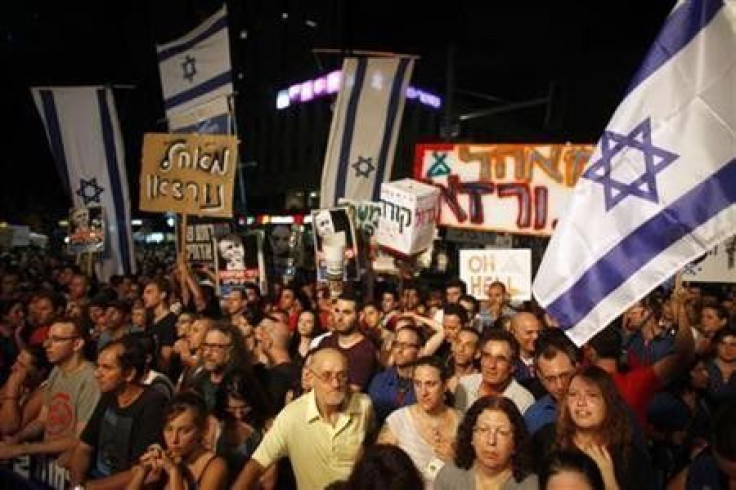Israeli protesters face moment of truth

Israel's social protest movement faces its moment of truth on Saturday when the turnout for a March of a Million demonstration in Tel Aviv will show whether a popular push for reform can be sustained, a leading organiser said.
One more time, the youth and students are calling to the nation that they want their support, Itzik Shmuli, head of the National Student Union and one of the protest's leaders, said in a Reuters interview. And I know my people -- they will come.
The protest movement got off the ground in July when a handful of young Israelis, frustrated with the high price of housing, pitched tents along a major boulevard in Tel Aviv.
The student union helped transform it into a movement that earlier this month inspired a quarter of a million Israelis, who usually only rally over issues of war and peace, to take to the streets.
Weekly protests have already brought change, including housing and consumer market reforms, and prompted Prime Minister Benjamin Netanyahu to appoint a committee to explore a much broader revamping of the government's economic policies. Its recommendations are due in a few weeks.
But the killing of eight Israelis on the Egyptian border by gunmen who Israel said infiltrated from the Gaza Strip via Egypt's Sinai desert and a subsequent surge in Israeli-Palestinian violence have switched the national focus over the past two weeks back to security issues.
And with summer holidays over for many Israelis and children now back in school, some political commentators predict waning public interest in protesting.
No doubt this is a moment of truth, Shmuli said about Saturday's rally, which could turn out to be the biggest demonstration in Israel's history.
Even 500,000 protesters would be good news, he said.
Rockets are falling on Israeli civilians and we need to solve that problem here and now. But in the same breath, you need to solve the socio-economic problems, Shmuli added.
Most of those who have filled the streets this summer come from the middle class, which bears Israel's heavy tax burden and sustains its conscript military. Although the country enjoys a low unemployment rate and a growing economy, many Israelis are bitter over high living costs and wide gaps in wages.
We're not looking for a personal fight with the prime minister. We're not interested. Or to make a change in his coalition. We're not interested, Shmuli said.
But added: I think we have all the reasons why not to believe the prime minister ... The burden of truth is on the government to bring solutions, together with us.
GRASSROOTS
The grassroots protest movement has been unique in its crossing of ethnic and political lines. But critics have pointed to disagreement among its leaders over whether to cooperate with the government-appointed reform panel.
Shmuli, who is favour of a dialogue with the forum, said there will always be differences within any authentic struggle for change. He and other young leaders of the protests have been hesitant to discuss in detail reforms that would appease them.
Our job is not to form a long list of demands. Our job is to come and present a vision, the job of the government is to respond, Shmuli said.
The National Student Union, which has not published any formal demands, is the most organized group within the protest, representing more than 60 campuses. Shmuli, 31, is halfway through a two-year term as its chairman.
Other groups within the protest movement have called for changes in taxation rates, an end to the Netanyahu government policy of drafting a two-year budget and state intervention to increase market competition.
Netanyahu has pledged major reform moves -- without going into detail -- while cautioning he will maintain fiscal responsibility in the state budget ... at a time of economic uncertainty.
What is clear is the protests have ensured that economic and social issues will be high on the agenda of the next Israeli parliamentary election, not due until 2013, that had been dominated in the past by diplomacy and security.
The Middle East's Arab Spring of regime change has served as an inspiration to the Israeli protest leaders.
We are looking what's going on in the world and want to show that we, too, are capable, Shmuli said. It is the era of Facebook and social networks, Twitter, YouTube that we simply connect through this new media to people our age.
Shmuli and his peers have steered clear of politicians looking to hitch a ride on the protest movement's popularity. But will they use their new fame to turn it into a party or enter politics themselves?
There are voices that talk about it. When they talk to me about it, I say this is not the time. If someone wants to stand up one day and make it a political party, okay, it's a legitimate thought, he said.
Politics is not a dirty word ... It's a possibility but no more than that.
© Copyright Thomson Reuters 2024. All rights reserved.











